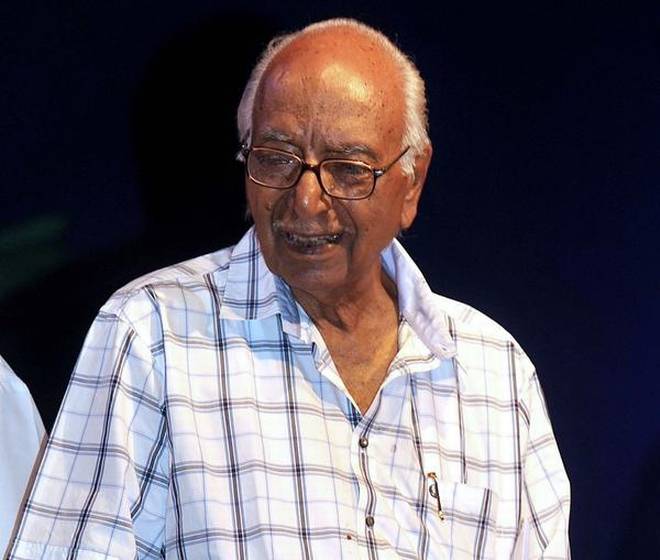
Poet-lyricist Naqsh Lyallpuri, who passed away on Sunday, has been largely forgotten by cinephiles. His songs many not have been the most poetic, but are remembers for their ‘hummability’
Naqsh, from which the word naqsha (referring to a design or a map) is derived, is used to refer to an impression, a mark or a print. The Lyallpur (Faisalabad)-born Jagdish Raj, who took on the pen name of ‘Naqsh Lyallpuri’, managed to barely do that, create a minor impression in the hearts of cinephiles despite being immensely talented.
Having had to compete with the Sahirs, the Hasrats and the Shailendras in the early part of his career and the Gulzars and the Majroohs in the later part, Lyallpuri had to settle for the odd number or two in albums of leading music directors. And due to the strong competition, he was forced to concentrate on ‘B-grade’ films and, later, Punjabi cinema.
Despite having reportedly worked with 145 music composers, Naqsh Lyallpuri’s name is unlikely to be remembered when one lists the lyricists to have made the greatest impact in Bombay. Nonetheless, there are a few melodies that will be recognised by their lyrics which bear his stamp.
a) Tumhe Ho Na Ho – Gharonda:
Like many of his other albums, the only song by Lyallpuri in the album. This one is often misattributed to Gulzar (and the other famous song in the album, Do Deewane Shahar Mein, to Lyallpuri).
Sung by Bangladeshi singer Runa Laila and played in the background, this one is about the lead character Chhaaya (Zarina Wahab) remaining in denial about her love for Sudeep (Amol Palekar) despite sensing the pull she experiences towards him, one she is not able to completely explain.
b) Tumhe Dekhti Hoon, To Lagta Hai Aise – Tumhare Liye:
Among the least-known Basu Chatterjee films, Tumhare Liye was about the oft-explored theme of reincarnation of two lovers, Gangadhar and Gauri, tragically separated in the previous birth. This song comes at a pivotal moment, where the past is connected to the present as Gauri sings of the two being bound by predestination, in this birth and the next.
c) Chandni Raat Mein Ek Baar Tujhe Dekha Hai – Dil-e-Nadaan:
A slow composition by Khayyam with minimum instrumentation, at least during rendering. The stanzas are interchangeable and similarly-structured, with rhyming endings which makes it memorable despite use of phrases like naz-o-andaz (pride in one’s mannerism).
d) Pyar Ka Dard Hai – Dard
Again, a song being made hummable due to repetition in the lyrics, like meetha-meetha, pyaara-pyaara, Kishore Kumar giving a softer touch to these phrases alone.
e) Ye Mulaqat Ek Bahaana Hai – Khandaan:
Khayyam and Jaidev were the composers for whom Lyallpuri gave his most famous lyrics. The opening lines of this song (which translate to: “this meet is just an excuse for something more profound”) became particularly famous.
f) Chitthiye Ni Dard Firaaq Vaaliye – Henna:
The only song for the movie where Ravindra Jain, the composer, needed Punjabi lyrics. The prime character Chandrakanth (Rishi Kapoor), a Kashmiri pandit, suffers an accident and strays into the Pakistan-occupied Kashmir. The Punjabi lyrics sound extraneous, considering that Henna (Zeba) – the Kashmiri girl who gives Chandrakanth a new lease of life on the other side of the line – is a gypsy who speaks only Kashmiri and Urdu.
g) Mumtaz Tujhe Dekha, Jab Taj Mahal Dekha – Taj Mahal:
An album remembered for being the last composed by classical titan Naushad. This song in the period drama – about the Shah Jahan-Mumtaz Mahal romance and the subsequent conjuring up of Taj Mahal – reflects the impression we get today on getting a glimpse of the Taj. We view Mumtaz and get a sense of both her beauty and the passion of Shah Jahan.
The penultimate stanza, where Lyallpuri gets Gulzar-ish while telling Ye Hasti Hui Aankhen(These Smiling Eyes) and Maine Teri Baaton Mein, Andaz-e-Ghazal Dekha (I Saw The Poignancy Of A Ghazal In Your Voice), is where he achieves poetic depth, one which makes this song memorable for more than just the opening lines, unlike many of the lyricist’s other songs.
[Source:-TH]
